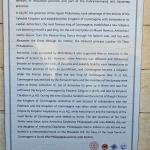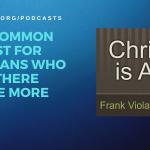
Monday: Read Ephesians 4:1-16
In 4:1-6:20, Paul turns his attention to the ethical life of the people of God and what it looks like to be a new community.
Paul begins in 4:1-16 by exhorting the community to maintain their unity in Christ. He opens with a strong exhortation, “Therefore, I implore/urge,beg you” (4:1). This certainly is meant to get the readers’ attention!
The use of “therefore ‘’ (1) looks back to Paul’s argument thus far in Ephesians. As such, 4:1 serves as the topic sentence for the rest of Ephesians. Paul’s point is that in light of the fact that God saved us in His grace while we were dead in our sins and included the gentiles into the body of Christ, we should “live a life worthy of the calling” (1). Paul, in other words, is now calling those who “formerly walked according to the course of this world” (2:1-2) to now walk according to their calling in Christ.
What does this look like? It begins with humility, gentleness, and patience (2).
Paul’s appeal to unity is based on the divine Trinity (4-6). Of course, unity in Christ does not deny diversity. Thus, he notes that we have all been given grace, but not all have the same quantity of grace (7). Paul goes on to list four gifts/offices (11): Apostles, prophets, evangelists, and pastors and teachers. (the Greek is pretty clear that there are four offices and not five. The last two—pastors and teachers—are one office).
God’s purpose in giving these gifts is the “equipping of the saints for work of service” (12). The goal is that God may “fill all things” (11). That is, in the present, the kingdom of God has not yet come in fulness. Until it does, we are to “grow up in all aspects into Him who is the head, even Christ” (15).
Questions to ponder/discuss:
- What is critical to note about the lists of spiritual gifts (1 Cor 12:8-10, 28; Rom 12:6-8; Eph 4:11) is that all Christians have at least one and that we cannot function well without everyone exercising their gifts. What gifts do you have? (not sure, ask others to help you). How are you using your gifts?
Tuesday: Read Ephesians 4:17-5:2
Paul continues to expand on his call to live a life worthy of the calling (4:1). He builds on the language of walking by contrasting their former lives (17-19) with their new life in Christ (20-24). As for our former lives, we are not to walk as the nations do (17). Paul then elaborates on what this means (17-19).
Then, Paul lays out what a life in Christ should look like (20-24). He begins by noting that we are to lay aside the old self (22), be renewed in our minds (23), and put on the new self (24).
In 4:25-5:2, Paul further expands on what it means to lay aside the old self. Paul lists negative commands (25-31) followed by positive commands (32-5:2).
He begins by noting that it means to speak the truth (25). Also, we should no longer steal. In fact, we should work so that we can give to others (28). And when we speak we are to do in a way that edifies others (29).
Paul’s list of positive commands include: be kind to one another (32), compassionate (32), and forgiving (32).
Paul concludes with “be imitators of God” (5:1). How do we do this? We are to “walk in love” (1). It is essential to note Paul’s example as to what it means to “walk in love”: “just as Christ also loved you and gave Himself up for us” (2).
Questions to ponder/discuss:
- It is my conviction that not walking like the nations (17) is one of the most difficult things to communicate to the contemporary western church. Too often we look just like everyone else. What do you think this might look like for Christians to live differently than the nations?
- When Paul says to “speak the truth” (25) it may appear as something easy. After all, I doubt that most of us make it a habit to lie to our neighbors. What, then, does he mean? Consider situations in which we might lie to someone else. What motivates us to lie in such situations? Now resolve yourself to rely on His grace to equip you to be truthful at all times.
- It is critical for the church to recognize that these are not lists of recommendations or suggestions. These are fundamental for what it means for God’s people. Oh, if only we as God’s people would live in accord with the new creation today! Then the church would be a force for good in the world.
- The command to work and support others has been abused by some. We will discuss this in our study of 1-2 Thessalonians.
Wednesday: Read Ephesians 5:3-14
Paul continues his contrast what they were before Christ and what they are now. He begins by noting that “immorality or any impurity or greed must not even be named among you” (3). By “immorality” Paul includes any kind of sexual immorality: in particular adultery and prostitution. When he lists “impurity” he is indicating sins that go beyond sexual sins. Finally, “greed” is the insatiable desire to have more. It is greed that leads to acts of immorality and impurity. Paul closes this command off with a strong reminder that such people will not inherit the kingdom (5).
Paul then uses the metaphor of light and darkness to contrast our old self and our new self (8-14). We were darkness (8). Therefore we should “not participate in the unfruitful deeds of darkness, but instead even expose them” (11). After all, it is “disgraceful even to speak of the things which are done by them in secret” (12)
On the contrary, we should “walk as children of Light” (8). What does this look like? Paul adds, “the fruit of the Light consists in all goodness and righteousness and truth” (9).
For Paul, the Christian life consists of “trying to learn what is pleasing to the Lord” (10).
Questions to ponder/discuss:
- What sins do you struggle with (this might be a private question if you are doing a group study)? How might you go about not participating “in the unfruitful deeds of darkness”? Ask the Lord for help. And consider asking others for help.
Thursday: Read Ephesians 5:15-6:9
Paul again exhorts them to be careful how they walk (15). In 5:15-21, Paul applies this to life in general. Then in 5:22-6:9, he applies it to life in the church.
Paul has previously contrasted their old life with their new by using the metaphor of light and darkness, now he employs the metaphor of wisdom and folly (15-18).
For Paul, to be wise means to understand the importance of God’s will (17). To live foolishly is to live according to our previous life.
Paul now takes what he has been saying (recall that 4:1 is the thesis statement for this entire section) and applies it to various relationships among the people of God (5:22-6:9). In this section, Paul discusses the relationship between husbands and wives (22-29), children and parents (6:1-4), and slaves and masters (5-9).
This section has much in common with Greco-Roman (GR) household codes. There are, however, some notable differences. For one, ancient household codes were hierarchical and patriarchal and based on the beliefs of the time. Paul’s code derives from a creational foundation (31: see Gen 2:24). Furthermore, GR codes were based on what advanced the interest of the state and those in power. Paul’s code is based on mutual obligations to one another. Finally, Paul’s code is profoundly liberating. He addresses wives, children, and slaves equally with husbands, parents, and masters. This was unheard of in the ancient world.
Questions to ponder/discuss:
- It is critical for our understanding of this passage to recognize that, although 5:21 closes the previous section, its force continues into the section that follows. Paul clearly establishes that the people of God are founded on mutual submission: “be subject to one another in the fear of Christ” (21). What are some examples of mutual submission in 5:22-6:9?
- This passage can hardly be read as NT support for the practice of slavery. Sure Paul does not condemn the institution. But we must recognize that slavery in the Greco-Roman world was not the same as the chattel slavery of the US. Furthermore, Paul had no voice with which to speak up in the GR political world. That is, speaking up would not have made a difference in the Roman world and it may have caused harm to the Gospel as it infiltrated Roman society. Paul does, however, undermine the very practice of slavery (both then and now) when he commands masters to “give up threatening” (6:9). Without the use of threats and punishments, masters would be left powerless to keep rebellious slaves in line.
Friday: Read Ephesians 6:10-24
In this closing section, Paul summarizes the whole of the letter. He does this by putting our struggles of living according to the Spirit into a cosmic perspective. Our struggles, he contends, are part of a larger war between forces of evil and good (11-13).
Paul first admonishes them to be “strong in the Lord” (10) and to “put on the full armor of God” (11): then we will be able to “resist in the evil day” (13).
In 14-17, he urges them to “stand firm” (14). This is followed by a listing of the armor (14-17). The list of the “armor of God” provides the details as to what it means to “stand firm.”
When it comes to the armor of God it is worth noting that the only offensive weapon is the “sword of the Spirit”, which Paul says is “the word of God” (17). Thus, although Paul uses the armor of God based on a soldier’s garb, he certainly does not mean to suppose that the people of God should use violence.
Finally, in 18-20, Paul concludes with a reminder that we need constant prayer. (note: when he says, “in the Spirit” (18) he likely means that we are to pray as we are guided by the Spirit)
Questions to ponder/discuss:
- Recognizing that our enemy is the devil is critical to fully understanding the nature of the kingdom and life in the kingdom. The nature of the kingdom is that Christ died for the nations. They are not our enemies—even though they may be the ones who imprison, torture, and kill us. They are at the same time those for whom Christ died. In addition, our struggle to be faithful is a cosmic struggle. We have an enemy. And he uses a “divide and conquer” strategy. Reflect on this and then list some ways in which understanding this may help to transform your perspective on things. What difference does it make knowing this? How might you view others differently?
- How well do you “pray at all times”? (18).
















